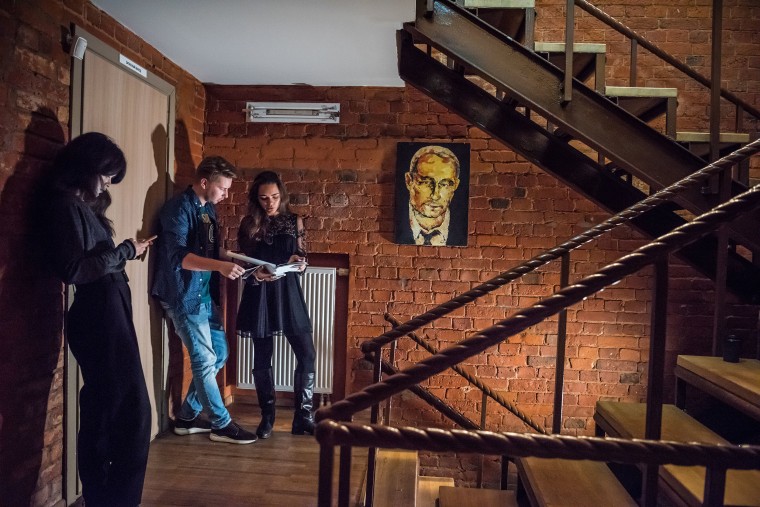MOSCOW — With its metal staircase, brick walls and bubble chairs, Project Network's office could easily be mistaken for a Silicon Valley start-up.
But this creative hub offers space, workshops and guidance to a specific group: pro-Kremlin Russian youths.
President Vladimir Putin is central to the group's ideology, and his presence is hard to miss.
Young artists and designers use the modern loft space to work under Putin's watchful eye: The Russian leader stares from a painted portrait hanging above the stairs.
Putin will be counting on their support when voters head to the ballot box in a presidential election scheduled for March 18. Opinion polls suggest he will win another six-year term.
Putin has already spent almost 14 years as president — and boasts two other stints as the country's prime minister. Another win would extend his lock on power to 24 years — longer than any Russian leader since Stalin.
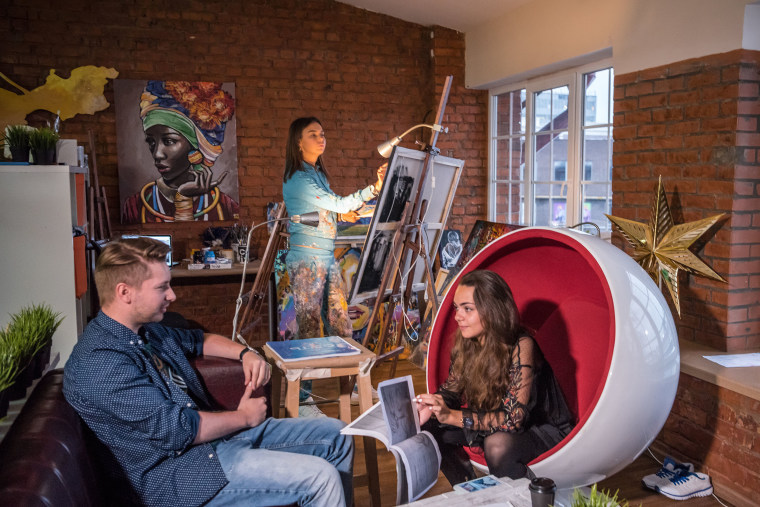
But despite corruption claims, political imprisonments and the suspicious deaths of many of Putin critics, the majority of young people support the former KGB agent.
A recent poll carried out by the Levada Center, Russia’s only major independent pollster, shows 86 percent of respondents aged 18 to 24 approved of Putin’s actions as president. He enjoys the same approval rating in the 25- to 39-year-old category.
A glass stand at Project Network displays a pair of rings bearing Putin's face. A note next to them reads: "Putinversteher," which means "those who understand Putin" in German.
The rings have been one of Project Network's most successful projects.
Makar Vihlyancev, a spokesman for the organization, says thousands have been sold in Russia and abroad. And in a “true measure of popularity,” they are now competing with cheap Chinese knockoffs.
Gleb Krainik, 32, who was a project manager behind the Putin rings, gets one out of the case and holds it up.
"He is the most powerful politician not only here in Russia, but in the world today," he said when asked about what inspired the jewelry.
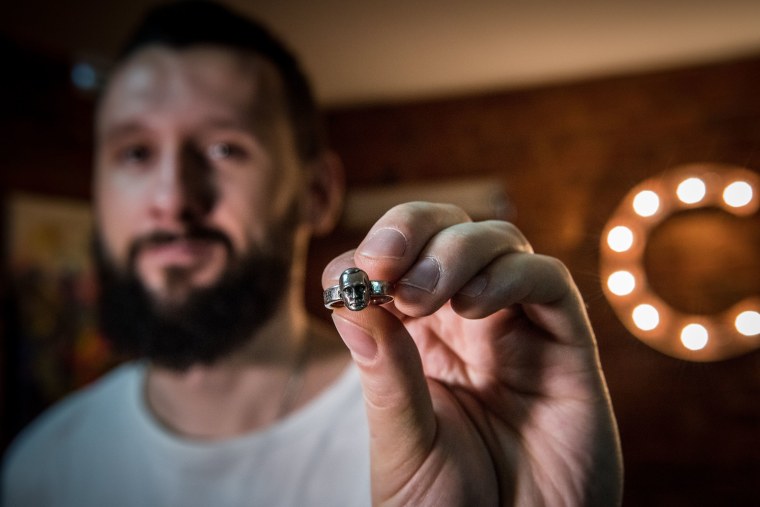
Putin is "everywhere here," adds Vihlyancev, 33, taking a stroll through the office. “But he is hard not to notice in the life of Russia as well.”
The creative types who use the space are not forced to incorporate Putin or patriotic themes into their work, Vihlyancev says, but many do. (Krainik declined to comment on whether Project Network received funding from the Kremlin, citing its "agreement with investors," adding: "This is one of the most common questions we get ... I am not going to answer it now either.")
On the far wall, there is a bright yellow painting in the shape of the Crimean Peninsula — a topic Vihlyancev says was popular with the group's artists following Crimea's 2014 annexation by Russia. Western leaders and the Ukrainian government in Kiev described the move as an illegal land grab by Putin.
Wearing a paint-splattered tracksuit and with headphones on, Yulia Khaliullina, a 25-year-old artist, stands next to the painting as she completes one of her own.
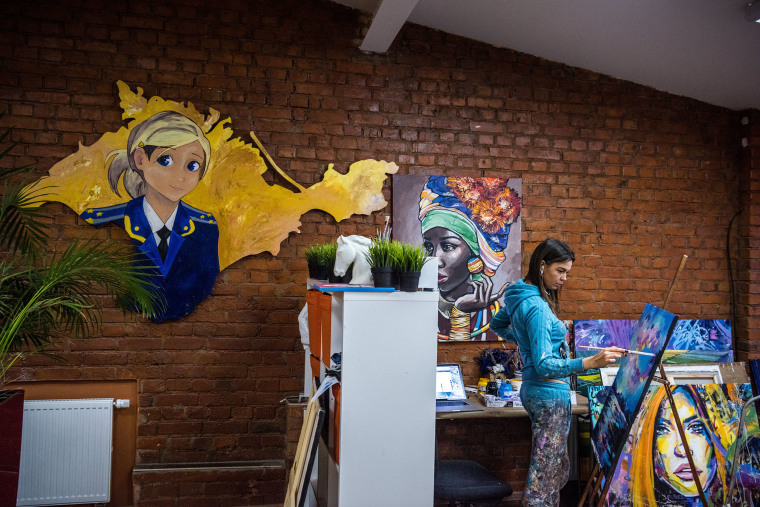
Khaliullina has painted many portraits of the Russian leader — for fun and commercial gain. And she has sold them all.
“There is definitely a demand for it,” Khaliullina adds. “It’s trendy.”
Khaliullina admits she doesn’t take much interest in politics, but says she is happy with the way things are in Russia and doesn’t want them to change.
“I feel like I can have many opportunities here," she said. "And it didn’t just happen — these conditions were created for us. I am a happy person and I think the government, and specifically Putin, played a role in it.”
Asked what she makes of criticism leveled against Putin, she responded: “I wouldn't draw him if I had even a hint of negativity toward him. I don’t paint people I don’t like, even for money.”
Taking a break from shopping at Moscow’s GUM department store just steps away from Red Square, Anastasia Stepanova and Anna Astasieva say they are likely to back Putin at the ballot box.
“There is only one option really,” Stepanova says, laughing. "The one everyone knows”
Both bubbly 20-year-olds are studying to be doctors and acknowledge that while many problems face modern-day Russia — from low salaries to the widening gap in the standard of living between Moscow and the rest of the country — the narrowness of the field running against Putin leaves them with few options.
“I don’t see anyone else who would be better or worthy," Stepanova adds.
But while Putin is popular among millennials, Levada Center polling found that only 15 percent of respondents aged 18 to 24 think he is serving the interests of “average people.” A majority believes he is looking out for the security services and oligarchs. And 74 percent in that age group say Putin is responsible — either directly or "to some extent" — for the problems facing Russia while he has been in power. The numbers are similar for Russians aged 25 to 39.
Sitting at a trendy coffee shop in central Moscow, Anton, a 30-year-old businessman, doesn’t mince words talking about Putin's 18 years as president and prime minister.
"The fish rots from its head,” says Anton, who spoke on the condition that only his last name would be used because he feared repercussions.
While he thinks Putin is a strong politician, he adds: “All the problems we are experiencing in Russia right now start with our president. He is the one responsible. If he is a god in this country, he is not doing that well.”
Anton says he is still considering his options for the looming election. He's struggling to find an alternative to the 65-year-old Putin.
“I don’t see an individual, or a political faction, which would be able to change anything in this country,” he said. “Maybe he or she will appear later, but right now I am left clueless about who to vote for."
Many Russians say they are disillusioned with traditional opposition parties like the Liberal Democratic Party of Russia and the Communists that have been in the political arena for years. Their leaders are widely considered token opposition figures under the Kremlin’s control.
Other candidates running against the incumbent include former reality TV star Ksenia Sobchak.
Sobchak's father was a political mentor to Putin, and their families were closely intertwined. But Sobchak, 36, denies being a Kremlin stooge and claims to be a candidate in her own right, campaigning for a fair judicial system, a better standard of living and more openness.
She has spoken out against Putin for years and has also said that Crimea belongs to Ukraine — an opinion neither popular nor considered patriotic by many in Putin's Russia.
"Russian people are not stupid," she told NBC News last month. "They know the system we are living [under] is undemocratic."
In a large co-op space just a 15-minute drive from the Kremlin, her campaign office is teeming with young people plugging away on laptops. They periodically look up to peek at large monitors hanging on the wall, where Sobchak’s social media accounts, followed by millions of people, are prominently displayed.
Mikhail Konev coordinates volunteers for the Sobchak campaign.
“It is very important that these kids, whether consciously or not, are not afraid and they still care,” Konev says. “Because if the very young people stop entering opposition politics and expressing their views, the political field will collapse and stop existing in Russia. The last of the opposition will be erased and Putin’s regime will reign.”
An opposition activist since the age of 17, Konev says he has paid dearly for his dissenting political views. He was studying to be a prosecutor, but claims to have been expelled from the university, kidnapped and forced to join the army by the secret service.
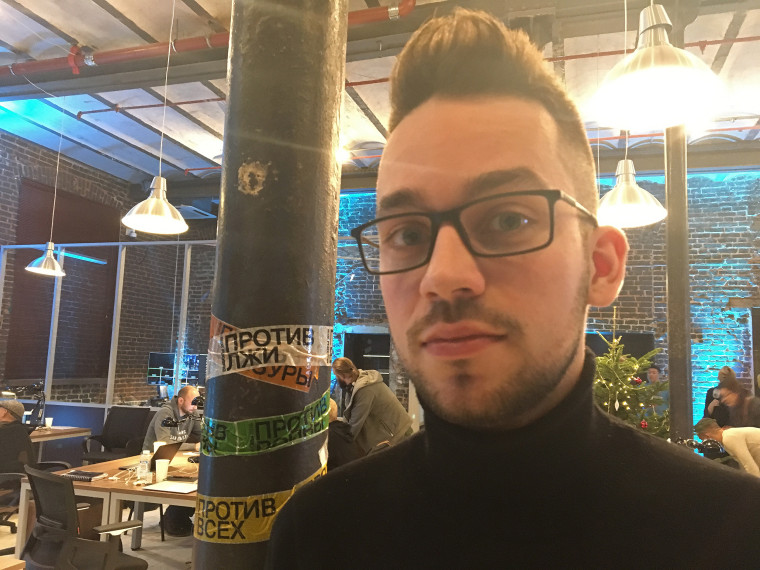
“Right now, our country is an international outcast. We are an aggressor,” he said.
Konev believes Sobchak "represents our generation, definitely more so than Vladimir Putin."
He added: “I am 24 years old — 18 of those I have lived under the rule of the same person, and I am absolutely not happy with his politics. I am categorically against censorship and lack of liberal freedoms in Russia."
Such sentiments were echoed by prominent anti-corruption crusader and lawyer Alexei Navalny before he was barred by election officials last month from registering to run against Putin.
He had been campaigning to become Russia’s next president for more than a year, conducting anti-corruption investigations into the current government elite along the way. Not allowed on state TV channels, he’s been talking to his supporters on YouTube, amassing more than 1.6 million subscribers.
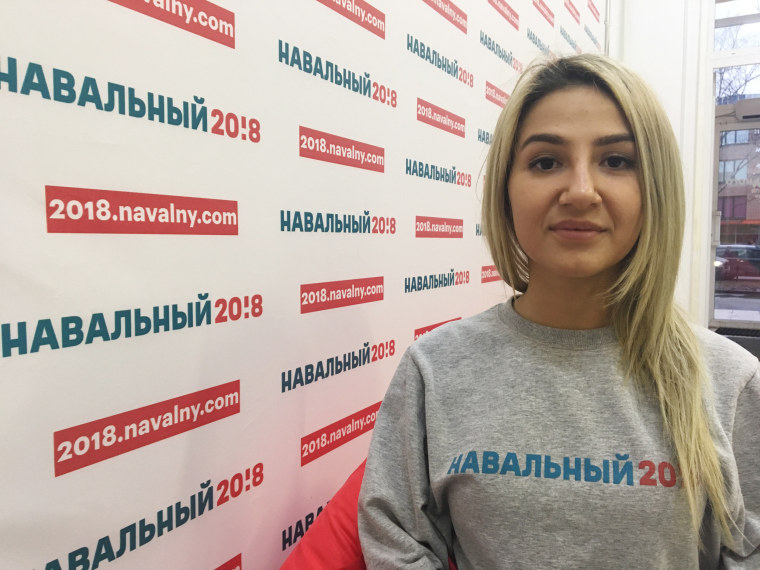
Before Navalny was booted from the race, Marina Tokareva, 24, had put her life on hold to be part of his team. With the Navalny campaign now shut down, Tokareva says she will follow his advice and boycott the election.
The biggest evil that Putin has perpetrated during his time in office, Tokareva says, is breeding apathy and indifference among Russians.
However, she insisted that Navalny, 41, had taken huge strides toward changing that.
“I think it is wonderful that young people are awakening and actually giving a damn," Tokareva said. "That means all is not lost.”
